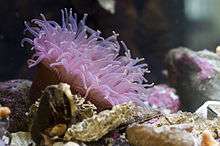Daphne Gail Fautin
Daphne Gail Fautin is an American professor of invertebrate zoology at the University of Kansas, specializing in sea anemones and symbiosis. She is world-renowned for her extensive work studying and classifying sea anemones and related species.[1] A large sea anemone-like cnidarian species has been named in her honor, originally called Boloceroides daphneae, but recently renamed to Relicanthus daphneae, after it was discovered (using DNA-based identification techniques) to belong to a previously unknown cnidarian order.[2][3][4] Fautin has published numerous scientific articles and texts—including co-authoring Encyclopædia Britannica's entry on cnidarians—and her publications have been widely cited by other researchers in the field. Among her current positions, she is the curator of the University of Kansas Natural History Museum and serves as vice president and commissioner of the International Commission on Zoological Nomenclature, overseeing the naming of new species.[5]
Daphne Gail Fautin | |
|---|---|
| Nationality | American |
| Occupation | Professor of invertebrate zoology |
| Known for | Extensive work and publications studying and classifying sea anemones and related genera |

Fautin has been called "the world authority on [sea] anemones",[1] by Prof. J. Frederick Grassle of Rutgers University, who led the international Census of Marine Life which was completed in 2010. She has personally identified at least 19 new species and has co-created with her husband, Prof. R. W. Buddemeier of the Kansas Geological Survey, an extensive database of hexacorals and related species as part of the census.[1][6]
Although she lives and works in landlocked Lawrence, Kansas, she feels that working from dry land is not a serious impediment, stating that "you only need to be near an airport, not the ocean."[1]
Education
She received her B.S. in biology (magna cum laude) in 1966 from Beloit College, Beloit, Wisconsin, and her Ph.D. in zoology in 1972 from the University of California, Berkeley. Her Ph.D. dissertation was "Natural History of the Sea Anemone Epiactis prolifera Verrill, 1869, with Special Reference to Its Reproductive Biology".[7]
Notes
- Rombeck, Terry (March 22, 2004). "KU marine life expert works from dry land". Lawrence Journal-World.
- Daly, Marymegan (December 2005). "Boloceroides Daphneae, a new species of giant sea anemone". Marine Biology. 148 (6): 1241–1247. doi:10.1007/s00227-005-0170-7.
- Howell, Elizabeth (May 18, 2014). "'Sea Anemone' Reclassified as New Kind of Animal". NBC News.
- Rodriguez, Estefania; et al. (May 7, 2014). "Hidden among Sea Anemones: The First Comprehensive Phylogenetic Reconstruction of the Order Actiniaria (Cnidaria, Anthozoa, Hexacorallia) Reveals a Novel Group of Hexacorals". PLOS ONE. 9 (5): e96998. doi:10.1371/journal.pone.0096998. PMC 4013120. PMID 24806477.
- Lynch, Brendan M. (December 5, 2013). "Reinventing the high court of organism names". phys.org.
- Fautin, Daphne Gail (July 2005). "Three Species of Intertidal Sea Anemones (Anthozoa: Actiniidae) from the Tropical Pacific: Description of Anthopleura buddemeieri, n. sp., with Remarks on Anthopleura asiatica and Gyractis sesere" (PDF). Pacific Science Center. 59 (3): 379–391. doi:10.1353/psc.2005.0035. hdl:10125/24184.
- "Dr. Daphne Fautin Curriculum Vitae". University of Kansas Natural History Museum. Archived from the original on July 17, 2014. Retrieved May 20, 2014.